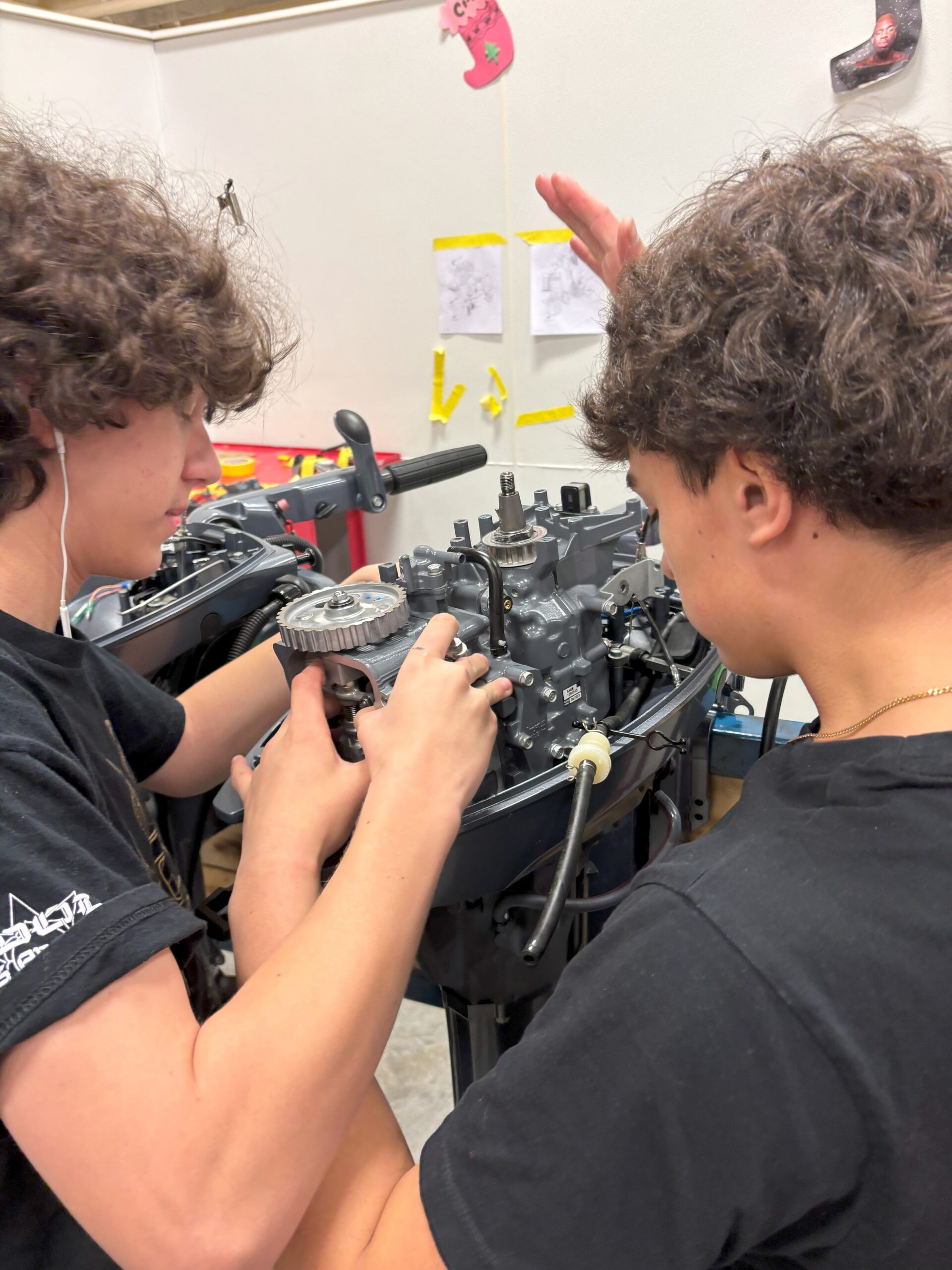CVTE
Marine Technology
Guy Shepherd, Academy C Administrator – Ext. 113
Course & Program of Studies

Statement of Purpose
The Marine Technology program at GNBRVTHS is dedicated to providing students with the skills and knowledge necessary to succeed in the maritime industry. Our program emphasizes:
- Hands-on Experience: Practical training on marine vessels and equipment.
- Safety and Environmental Awareness: Promoting safety practices and environmental stewardship.
- Technical Proficiency: Developing expertise in marine mechanics, electrical systems, and navigation.
- Problem-Solving and Critical Thinking: Cultivating strong problem-solving and decision-making skills.
- Career Pathways: Guiding students towards successful careers in the maritime industry, including marine engineering, boat building, and marine operations.
By combining theoretical knowledge with practical skills, our program prepares students for a rewarding career in the maritime industry.
Exploratory Program
The Marine Service Technology Exploratory program offers a comprehensive introduction to the world of marine technology. This program is designed to spark interest and help students make informed decisions about their future career paths. Key components of the program include:
- Boat Building: Hands-on experience in boat building techniques, including fiberglassing and woodworking.
- Marine Engine Service: Basic maintenance and repair of outboard and inboard engines.
- Boat Handling and Navigation: Understanding basic boat handling techniques, line handling and navigation principles.
- Marine Safety: Learning about safety procedures and regulations in the marine industry.
- Career Exploration: Discussing various career opportunities in marine technology, such as marine mechanic, boat builder, seaman, and marine surveyor.
Through these experiences, students will gain a deeper understanding of the marine industry and develop a passion for marine technology.
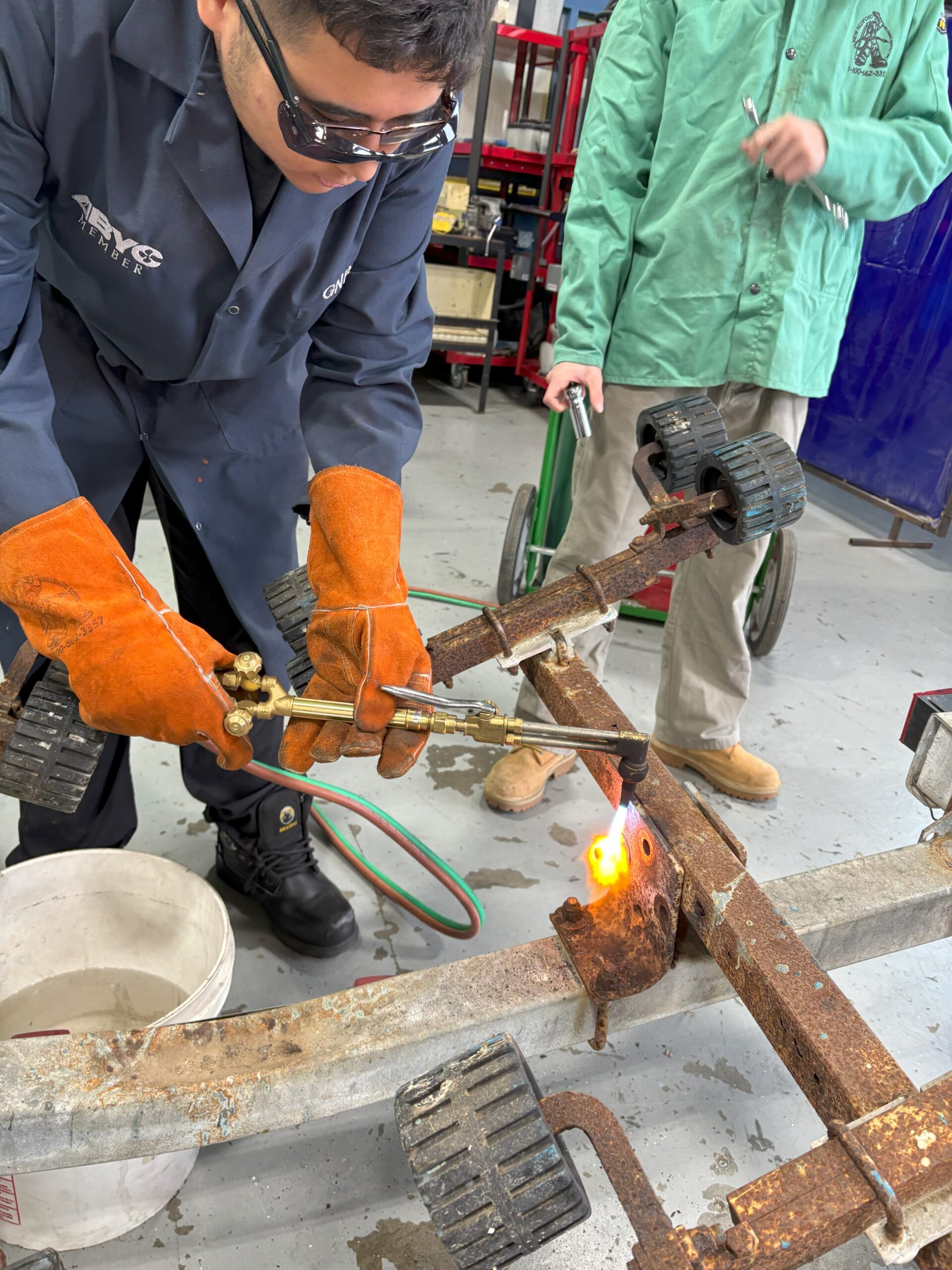
Freshman Program
Marine Technology
The Freshman Marine Technology program provides a strong foundation in the fundamentals of marine technology. Key areas of focus include:
- Marine Safety:
- Understanding safety regulations and procedures.
- Obtaining a boating safety license.
- General shop safety, tool and equipment use and maintenance.
- Boat Building:
- Fiberglassing techniques, including laminating and sanding.
- Woodworking skills, such as cutting, shaping, and finishing wood.
- Basic welding techniques.
- Marine Maintenance:
- Hull maintenance, including cleaning, waxing, and polishing.
- Engine maintenance, including oil changes and basic troubleshooting.
- Electrical system maintenance and troubleshooting.
- Boat Handling:
- Basic boating skills, including docking, mooring, and anchoring.
- Navigation and chart reading.
Through a combination of classroom instruction and hands-on experience, students will develop the skills and knowledge necessary to work in the marine industry. By the end of the freshman year, students will be well-prepared to advance to more complex tasks in their sophomore year.
Sophomore Program
The Sophomore Marine Technology program builds upon the foundational skills acquired in the freshman year. Key areas of focus include:
Marine Safety:
- OSHA 10-Hour Safety Training: Understanding safety regulations and procedures in the marine industry.
- First Aid and CPR: Learning basic first aid and CPR techniques.
- Fire Safety: Understanding fire prevention and firefighting techniques.
Marine Engine Systems:
- Outboard Engines: Understanding the principles of operation, maintenance, and troubleshooting of outboard engines.
- Inboard Engines: Understanding the principles of operation, maintenance, and troubleshooting of inboard engines.
- Drive Systems: Learning about different types of drive systems, including outboard, stern-drive, and inboard.
Marine Electrical Systems:
- Understanding marine electrical systems, including batteries, wiring, and electrical components.
- Troubleshooting electrical problems on boats.
Dealer Specific Training:
- Yamaha Introduction to Outboard Systems
- Yamaha Introduction to Jet Drives
Through a combination of classroom instruction and hands-on experience, students will develop the skills and knowledge necessary to work as marine technicians. By the end of the sophomore year, students will be well-prepared to advance to more complex tasks in their junior and senior years.
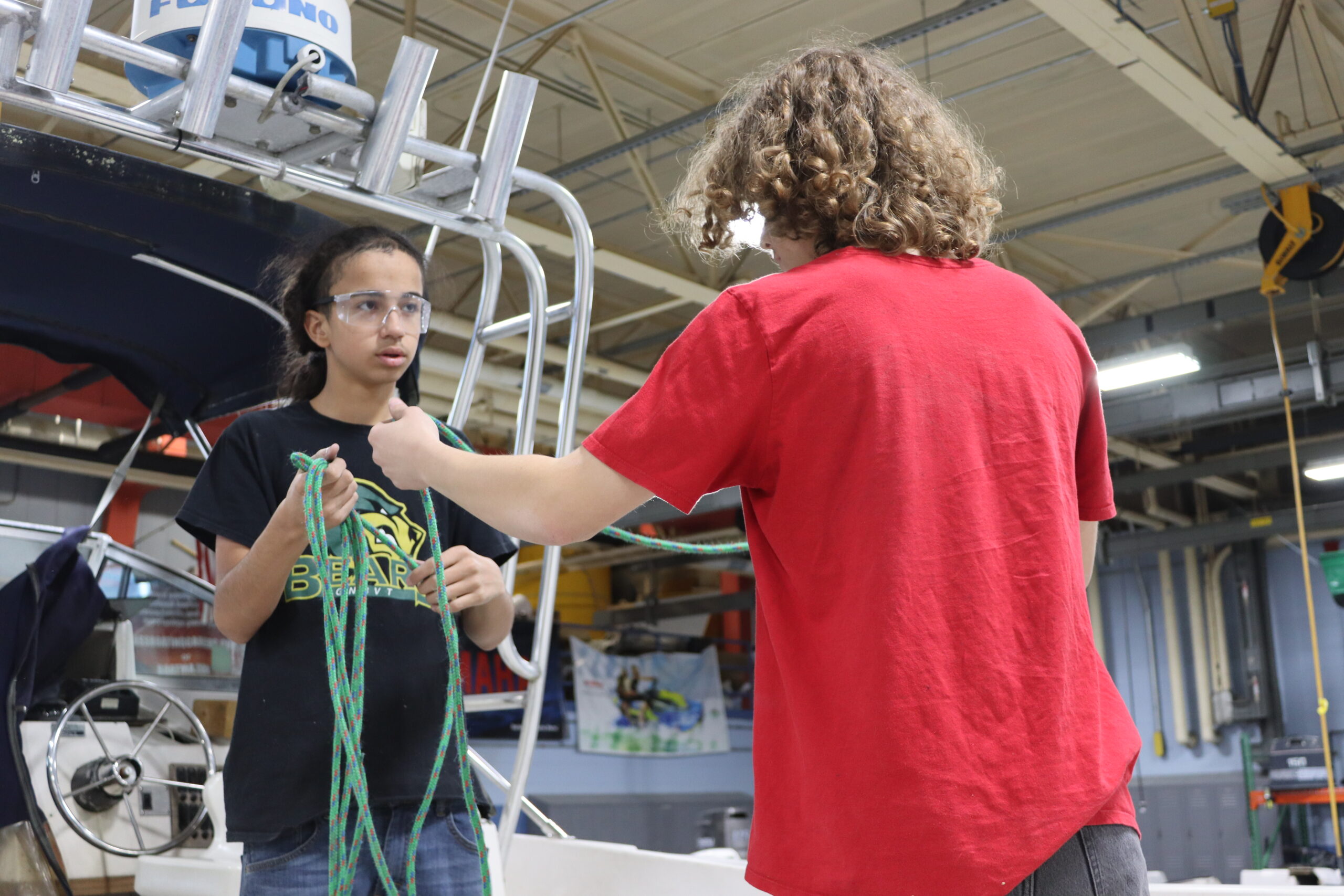
Sophomore Related Class 1
Internal Combustion Engine Theory
The Sophomore Marine Technology related program delves deeper into the intricacies of marine engine systems. Key areas of focus include:
Internal Combustion Engines:
- Four-Stroke Engines: Understanding the principles of operation, including intake, compression, power, and exhaust strokes.
- Two-Stroke Engines: Understanding the principles of operation, including intake and compression/power/exhaust strokes.
- Engine Components: Learning about engine components, such as cylinders, pistons, connecting rods, camshafts, and valves.
- Fuel Systems: Understanding different types of fuel systems, including carburetor and fuel injection systems.
- Ignition Systems: Learning about ignition systems, including spark plugs, ignition coils, and electronic ignition systems.
- Cooling Systems: Understanding different types of cooling systems, including water-cooled and air-cooled systems.
- Lubrication Systems: Understanding the importance of lubrication and how to maintain lubrication systems.
- Electrical Systems: Understanding the fundamentals of AC and DC electricity and apply to engine principals.
Engine Maintenance and Repair:
- Engine Disassembly and Reassembly: Learning how to disassemble and reassemble engines.
- Identify engine failures
- Identify engine systems, assemblies and parts
Safety and Environmental Practices:
- Understanding and following safety procedures when working on engines.
- Properly disposing of hazardous materials and waste.
By the end of the sophomore year, students will have a solid understanding of marine engine systems and be able to perform basic maintenance and repair tasks.
Sophomore Related Class 2
Fundamentals of Marine Service Technology
The Sophomore Marine Technology program delves deeper into the intricacies of marine engine systems, specifically focusing on outboard and jet drive engines. Key areas of focus include:
Outboard Engines:
- Engine Components: Understanding the components of outboard engines, including the powerhead, lower unit, and propeller.
- Engine Operation: Learning about the principles of two-stroke and four-stroke engine operation.
- Fuel Systems: Understanding different types of fuel systems, including carburetor and fuel injection systems.
- Ignition Systems: Learning about ignition systems, including spark plugs, ignition coils, and electronic ignition systems.
- Cooling Systems: Understanding different types of cooling systems, including water-cooled and air-cooled systems.
- Lubrication Systems: Understanding the importance of lubrication and how to maintain lubrication systems.
- Troubleshooting and Repair: Identifying and troubleshooting common problems with outboard engines.
Jet Drive Systems:
- Jet Pump Operation: Understanding the principles of jet pump operation.
- Impeller and Wear Ring Maintenance: Learning how to maintain and replace impellers and wear rings.
- Jet Drive Troubleshooting: Identifying and troubleshooting common problems with jet drive systems.
Hands-on Experience:
- Disassembling and reassembling outboard engines.
- Performing routine maintenance tasks, such as oil changes and filter replacements.
- Troubleshooting engine problems and making repairs.
- Working with marine tools and equipment.
By the end of the sophomore year, students will have a solid understanding of outboard and jet drive engines and be able to perform basic maintenance and repair tasks. They will also be well-prepared to advance to more complex engine systems in their junior and senior years.
Junior Program
The Junior Marine Technology program builds upon the foundational knowledge and skills acquired in the previous years. Key areas of focus include:
Engine Diagnostics and Repair:
- Advanced Engine Diagnostics: Utilizing diagnostic tools to identify and troubleshoot engine problems.
- Engine Performance Tuning: Optimizing engine performance through adjustments and modifications.
- Engine Repair: Performing complex engine repairs, including cylinder head and block repairs.
- Fuel System Diagnosis and Repair: Troubleshooting fuel system problems, including carburetor and fuel injection issues.
- Electrical System Diagnosis and Repair: Diagnosing and repairing electrical systems, including wiring harnesses, alternators, and starters.
Drivetrain Systems:
- Drivetrain Components: Understanding the components of different drive systems, including propellers, shafts, and gears.
- Drivetrain Alignment: Aligning drive systems to ensure optimal performance and efficiency.
- Drivetrain Maintenance: Performing routine maintenance tasks, such as greasing and lubrication.
- Drivetrain Troubleshooting: Identifying and troubleshooting drivetrain problems.
Marine Electronics:
- Basic Electronics: Understanding basic electrical principles and circuit analysis.
- Marine Electronics Systems: Learning about marine electronics systems, including GPS, radar, and fish finders.
- Marine Electronics Installation and Troubleshooting: Installing and troubleshooting marine electronics equipment.
Environmental Awareness and Safety:
- Environmental Regulations: Understanding and complying with environmental regulations.
- Waste Disposal: Properly disposing of hazardous materials and waste.
- Safety Practices: Adhering to safety protocols and using personal protective equipment.
By the end of the junior year, students will be well-prepared to enter the workforce as marine technicians or continue their education in advanced marine technology programs.
Cooperative Education:
The program offers cooperative education opportunities, allowing students to gain hands-on experience in real-world marine settings. Students can work alongside experienced marine technicians, apply their skills, and learn from industry professionals. This valuable experience helps students transition smoothly from the classroom to the workplace.
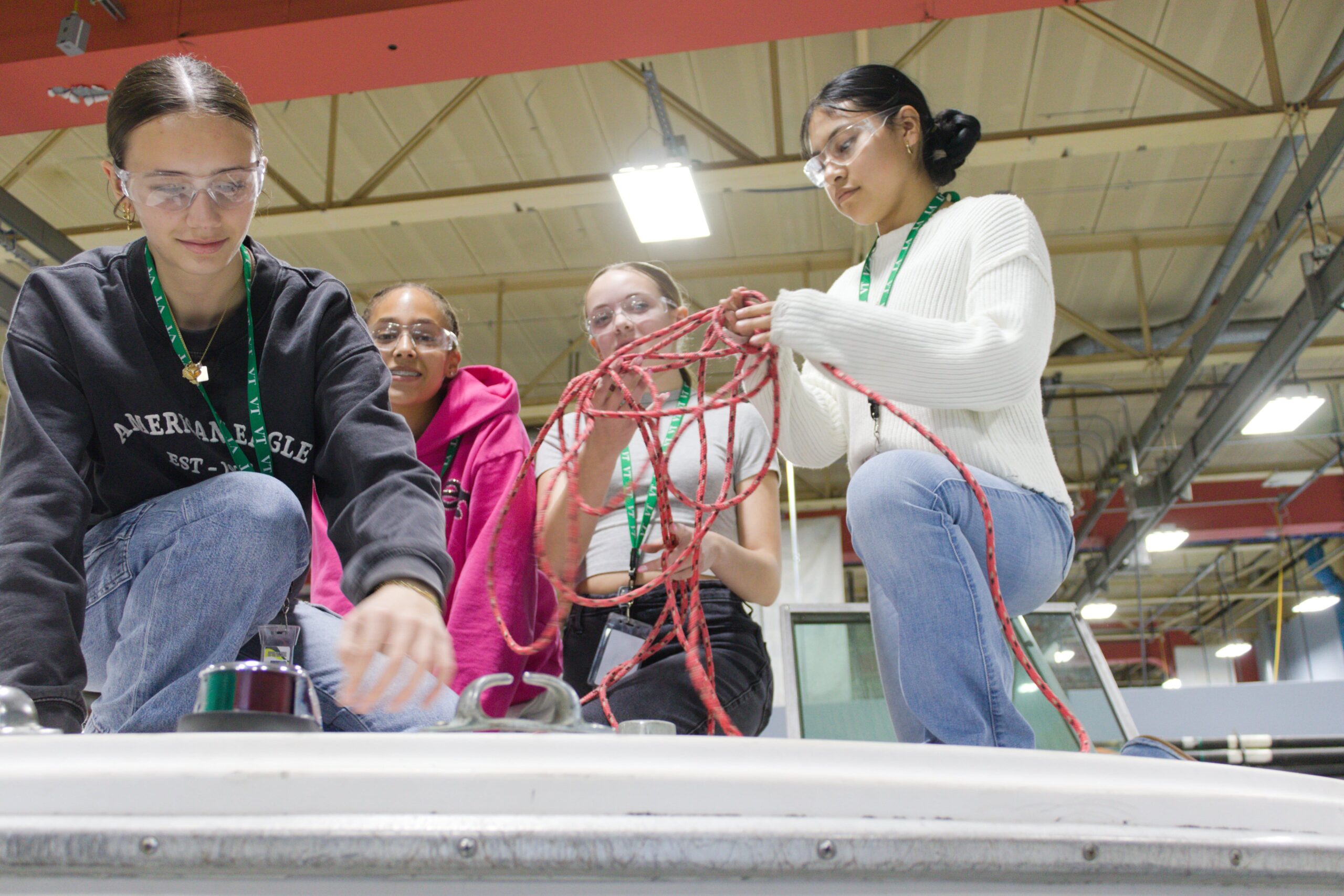
Junior Related 1
Marine Gasoline Engine Certification
The ABYC Gasoline Engine Certification is a valuable credential for individuals working in the marine industry. This certification validates knowledge and skills in the following areas:
- Engine Fundamentals:
- Principles of internal combustion engines
- Four-stroke and two-stroke engines
- Engine components and their functions
- Fuel Systems:
- Fuel injection systems
- Carburetor systems
- Fuel tanks and lines
- Ignition Systems:
- Spark plug systems
- Electronic ignition systems
- Electrical Systems:
- Battery systems
- Alternators and charging systems
- Wiring diagrams and troubleshooting
- Cooling Systems:
- Raw water cooling systems
- Closed-loop cooling systems
- Heat exchangers and thermostats
- Exhaust Systems:
- Exhaust system components and configurations
- Exhaust system maintenance and troubleshooting
- Drive Systems:
- Outboard, stern-drive, and inboard drive systems
- Propellers and shafts
- Steering systems
By obtaining this certification, individuals demonstrate their commitment to industry standards and their ability to safely and efficiently maintain and repair gasoline-powered marine engines. This certification is recognized by marine industry professionals and can enhance career opportunities.
Junior Related 2
Marine Electrical Certification
The ABYC Marine Electrical Certification is a valuable credential for individuals working in the marine industry. This certification covers a wide range of electrical systems and components found on boats and yachts. Key areas of focus include:
- Electrical Fundamentals:
- Ohm’s Law and Kirchhoff’s Laws
- AC and DC circuits
- Electrical safety practices
- Battery Systems:
- Battery types and selection
- Battery charging systems
- Battery maintenance and testing
- AC Systems:
- AC power distribution systems
- Inverters and chargers
- Shore power connections
- DC Systems:
- DC power distribution systems
- Circuit breakers and fuses
- Wiring and cable installation
- Electrical Components:
- Switches, relays, and circuit breakers
- Motors and controls
- Sensors and transducers
- Troubleshooting and Diagnostics:
- Identifying and resolving electrical issues
- Using diagnostic tools and techniques
By obtaining this certification, individuals demonstrate their expertise in marine electrical systems, ensuring the safe and reliable operation of boats and yachts. This certification is recognized by marine industry professionals and can enhance career opportunities.
Senior Program
The Senior Marine Technology program culminates in a comprehensive curriculum that prepares students for advanced roles in the marine industry. Key areas of focus include:
Advanced Marine Mechanics:
- Engine Overhaul: Disassembling, rebuilding, and reassembling engines, including engine blocks, cylinder heads, and connecting rods.
- Fuel System Repair: Diagnosing and repairing fuel injection systems, carburetors, and fuel tanks.
- Electrical System Repair: Troubleshooting and repairing complex electrical systems, including wiring harnesses, alternators, and starters.
- Drive System Repair: Diagnosing and repairing drive systems, including propellers, shafts, and gears.
Boat Repair and Restoration:
- Hull Repair: Repairing fiberglass, wood, and aluminum hulls.
- Paint and Gel Coat Repair: Applying paint and gel coat to restore the appearance of boats.
- Interior Upholstery: Repairing and replacing upholstery and interior components.
- Boat Restoration: Restoring classic boats to their original condition.
Business and Management:
- Customer Service: Interacting with customers, understanding their needs, and providing excellent customer service.
- Estimating and Invoicing: Preparing accurate repair estimates and invoices.
- Inventory Management: Managing inventory levels and ordering parts.
- Shop Management: Overseeing shop operations, including scheduling and workflow.
Cooperative Education:
- Gaining hands-on experience in a real-world marine setting.
- Applying skills and knowledge learned in the classroom to real-world situations.
- Networking with industry professionals.
By the end of the senior year, students will be well-prepared to enter the workforce as skilled marine technicians. They will have the knowledge and skills to diagnose and repair complex marine systems, manage projects, and provide excellent customer service.
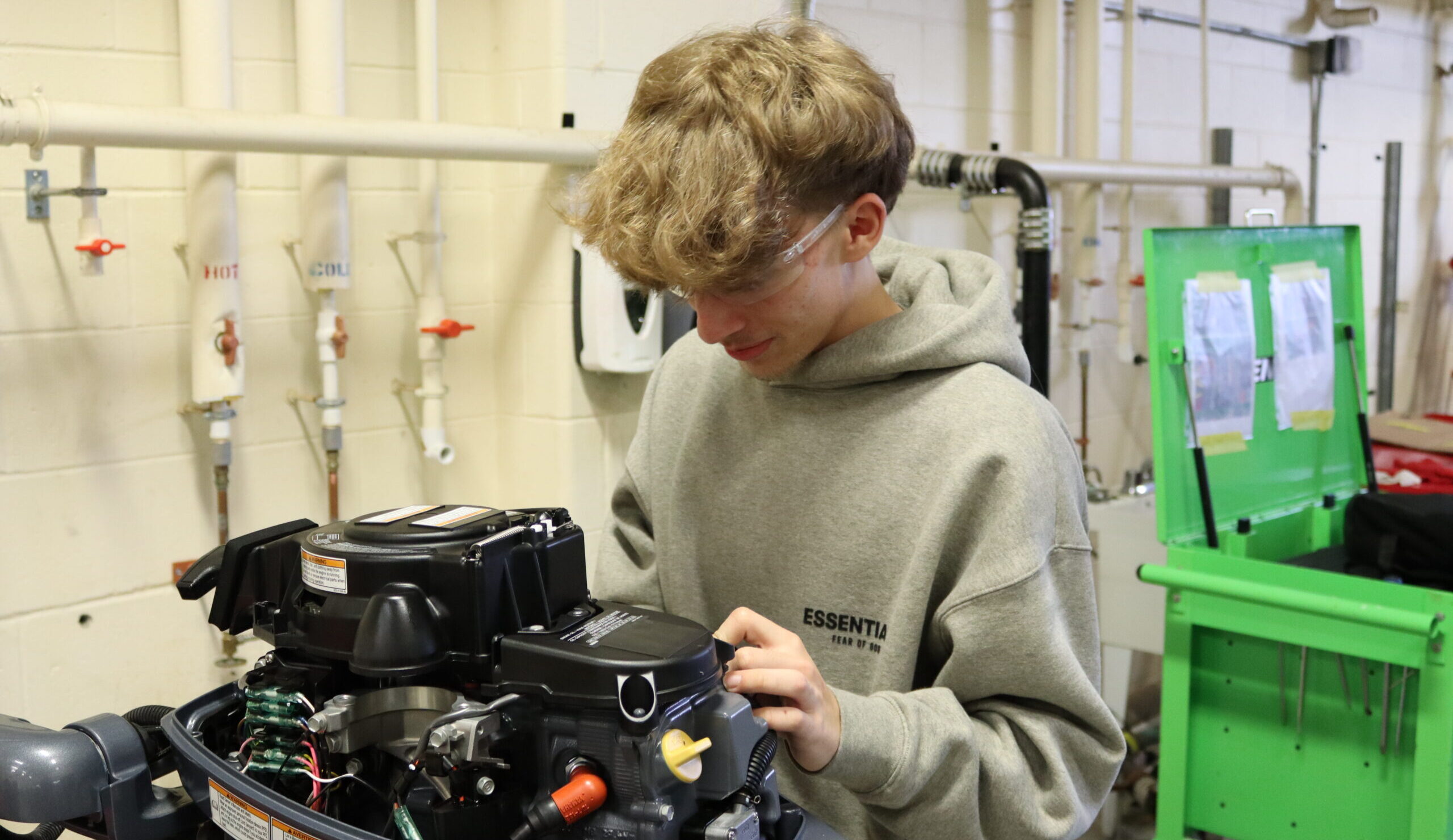
Senior Related 1
Marine Systems Certification
The ABYC Systems Certification is a comprehensive program that provides a deep understanding of various marine systems. Key areas of focus include:
Marine Systems:
- Potable Water Systems: Understanding the design, installation, and maintenance of potable water systems, including pumps, tanks, and filtration systems.
- Sanitation Systems: Understanding the design, installation, and maintenance of sanitation systems, including holding tanks and pump-out systems.
- Hull Piping Systems: Understanding the design, installation, and maintenance of hull piping systems, including plumbing and fuel systems.
- Electrical Systems: Understanding the design, installation, and maintenance of marine electrical systems, including wiring, circuit breakers, and electrical components.
- Engine Systems: Understanding the principles of operation, maintenance, and troubleshooting of marine engines, including gasoline and diesel engines.
- Air Conditioning and Refrigeration Systems: Understanding the principles of refrigeration and air conditioning systems, including installation and maintenance.
- Steering and Control Systems: Understanding the principles of steering and control systems, including hydraulic and mechanical systems.
- Fire Protection and Suppression Systems: Understanding the principles of fire protection and suppression systems, including fire extinguishers and automatic fire suppression systems.
Mercury Marine University Certification:
- Marine Basics: Understanding basic marine terminology, safety procedures, and tools.
- Engine Fundamentals: Understanding the principles of engine operation, including two-stroke and four-stroke engines.
- Fuel Systems: Understanding fuel systems, including fuel injection and carburetor systems.
- Electrical Systems: Understanding marine electrical systems, including batteries, alternators, and wiring.
- Cooling Systems: Understanding cooling systems, including raw water and closed-loop cooling systems.
- Shop Tools: Learning how to use various shop tools and equipment.
By completing the ABYC Systems Certification and Mercury Marine University Certification, 12th-grade students will gain a strong foundation in marine systems and be well-prepared for careers in the marine industry.
Senior Related 2
Marine Diesel Certification
The ABYC Marine Diesel Certification is a valuable credential for individuals working in the marine industry. This certification covers a wide range of topics related to marine diesel engines, including:
Diesel Engine Fundamentals:
- Engine Operation: Understanding the principles of diesel engine operation, including four-stroke and two-stroke cycles.
- Engine Components: Identifying and understanding the function of various engine components, such as cylinders, pistons, connecting rods, camshafts, and valves.
- Fuel Systems: Understanding the operation of diesel fuel systems, including fuel injection systems, fuel filters, and fuel tanks.
- Ignition Systems: Understanding the operation of diesel ignition systems, including glow plugs and injectors.
- Cooling Systems: Understanding the operation of different cooling systems, including raw water cooling and closed-loop cooling.
- Exhaust Systems: Understanding the principles of exhaust systems, including exhaust manifolds, mufflers, and emissions controls.
Marine Diesel Engine Maintenance and Troubleshooting:
- Routine Maintenance: Performing regular maintenance tasks, such as oil changes, filter replacements, and belt adjustments.
- Engine Diagnostics: Using diagnostic tools to identify and troubleshoot engine problems.
- Engine Repair: Performing engine repairs, including cylinder head and block repairs, valve jobs, and piston replacements.
- Fuel System Maintenance and Repair: Maintaining and repairing fuel systems, including injectors, pumps, and filters.
- Electrical System Maintenance and Repair: Maintaining and repairing electrical systems, including alternators, starters, and wiring harnesses.
- Cooling System Maintenance and Repair: Maintaining and repairing cooling systems, including water pumps, thermostats, and heat exchangers.
By obtaining this certification, individuals demonstrate their expertise in marine diesel engines and their ability to provide quality maintenance and repair services. This certification is recognized by marine industry professionals and can enhance career opportunities.
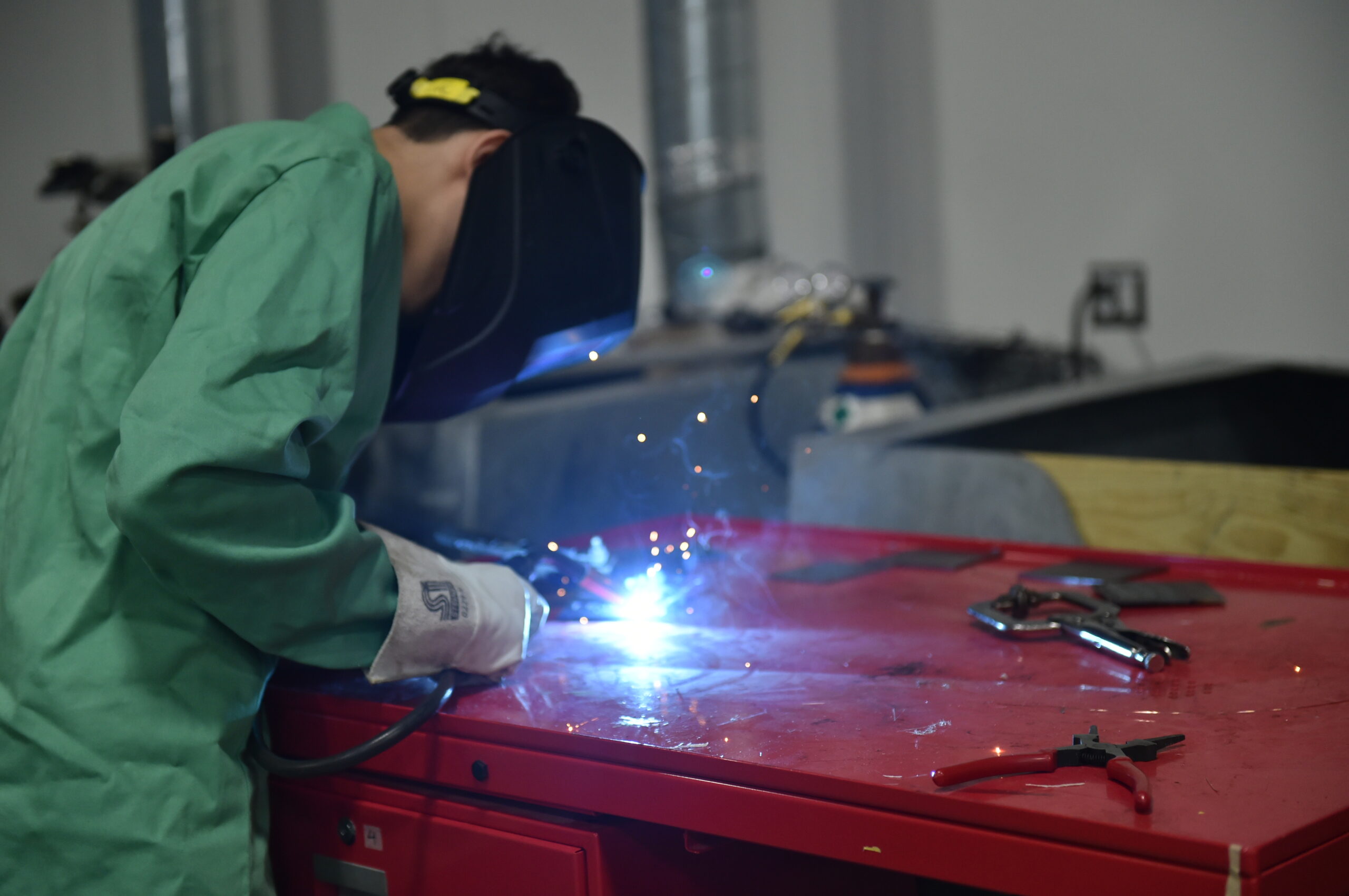
Certifications
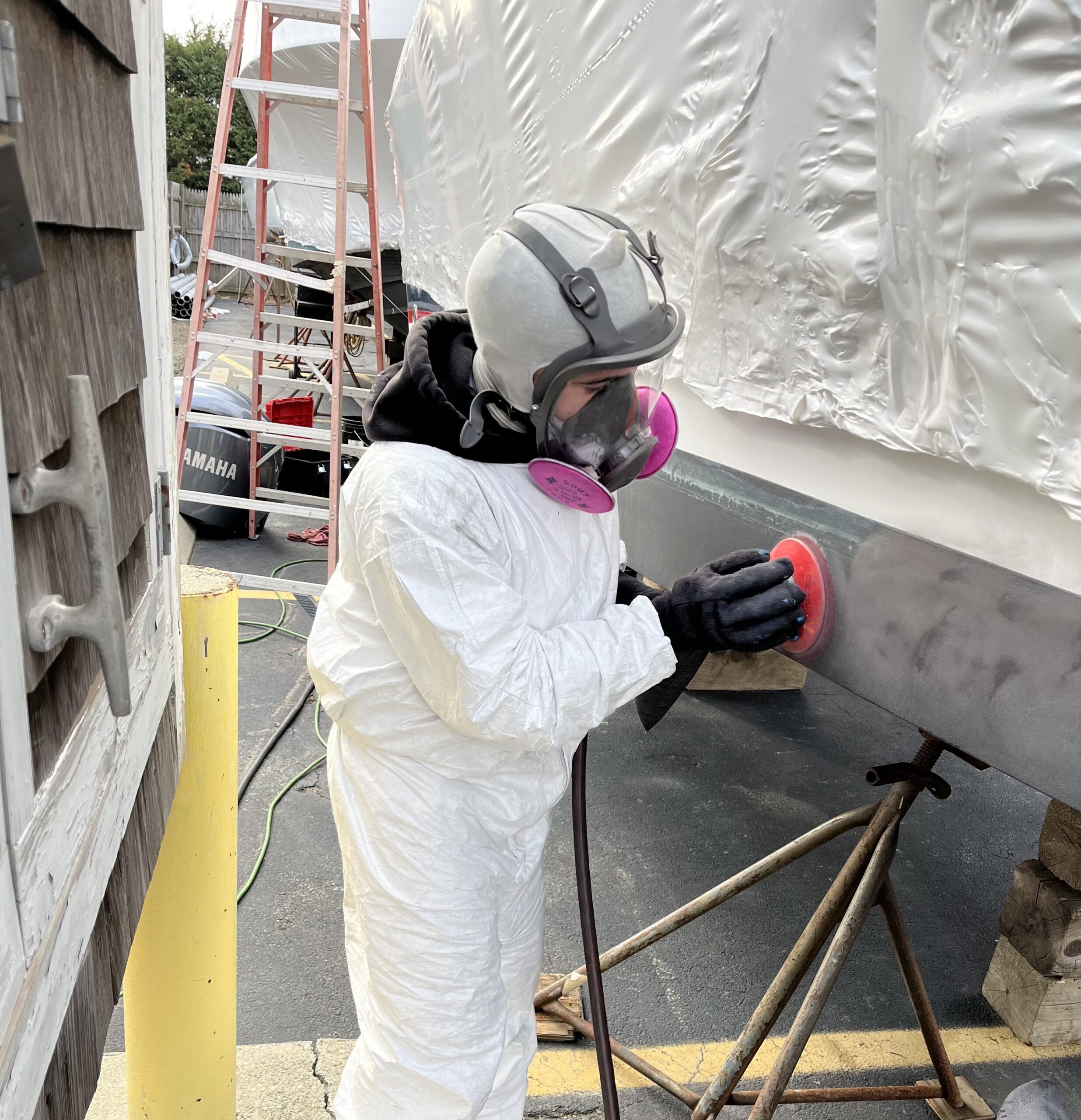
- OSHA 10
- USCG US Sailing Safe Powerboat Handling Certification
- MA Boating License
- Yamaha Marine
- Mercury Marine
- American Boat and Yacht Council (ABYC)
Career Opportunities
- Military; Coast Guard, Navy
- Facilities Management for Shipyards, Marinas
- Marine Mechanic
- Marine and Underwater Welder
- Marine Engineer
- Marine Carpenter
- Marine Electrician
- Ship Builder
- Rigging Technician
- Marine Painter
- Fiberglass Repair Technician
- Upholstery and Interior Technician
- Mobile Repair Businesses
- Charter Fishing industry
- Commercial Fishing Industry
- Offshore Wind Industry
Post-Secondary Education
- Northeast Maritime Institute, MA
- Mass Maritime Academy
- The Landing School, ME
- MMI (Marine Mechanics Institute)
- New England Institute of Technology
- ABYC Member Training
